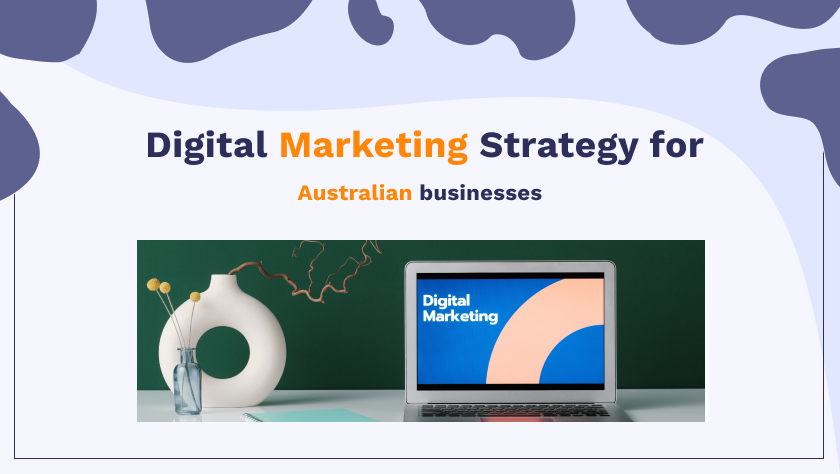Are you looking for an effective way to grow your business? Our digital marketing strategy for Australian business owners will help you widen your idea in the different marketing tactics implementation we mention below. In this blog post, we’ll share some of the best digital marketing tips and tricks that will help your business reach new heights. So, without further ado, let’s get started!
Digital marketing is fast becoming an essential strategy for businesses in Australia looking to stay competitive. Digital marketing strategies in Australia can involve a wide range of tactics, from collaborating with influencers on social media channels to deploying automated email campaigns and optimising web content for SEO.
It’s important that businesses identify their unique Digital Marketing Strategy goals and tailor tactics appropriate to those needs. With clear objectives and a creative Digital Marketing Strategy, Australian businesses have the potential to make great strides in the digital age.
Table of Contents
What is digital marketing strategy?
A digital marketing strategy is a plan of action that businesses use to market their products and services on the internet. This can be done through various online channels such as search engines, social media, email marketing, and website content.
Digital marketing strategies are important for businesses to implement because they allow businesses to reach a larger audience with less effort than traditional marketing methods. Additionally, digital marketing strategies can be customized to target specific demographics and interests.
If you’re interested in learning more about digital marketing strategy, keep reading! We’ll discuss what it is, why it’s important, and how you can create your own effective strategy.
Why your business needs a digital marketing strategy
Digital Marketing Strategy for Australia is key for any business in the digital age. Digital marketing provides a platform to reach customers across the globe, quickly and cost-effectively, which makes it a necessity in today’s digital and competitive landscape. Utilizing digital channels like SEO, PPC, content marketing, and social media marketing can help you create brand awareness across digital channels, drive leads and conversions, increase ROI and build customer loyalty.
Furthermore, having a digital marketing strategy in place for ecommerce businesses will enable you to use digital analytics to measure and track the performance of your entire process including website traffic, promotions generated, and customer behavior. With the right digital marketing strategy in place, your business will be well on its way to success.
Why your business needs a digital marketing strategy
With digital marketing becoming so influential in today’s world, having a digital marketing strategy for your business can be a great way to reach the right demographics and keep up with the competition. Whether you’re based in Australia or somewhere else around the globe, digital marketing is an important tool for success. Developing a digital marketing strategy involves understanding your target audience and assessing the digital platforms they use, such as social media and search engines.
With digital marketing becoming so influential in today’s world, having a digital marketing strategy for your business can be a great way to reach the right demographics and keep up with the competition. Whether you’re based in Australia or somewhere else around the globe, digital marketing is an important tool for success. Developing a digital marketing strategy involves understanding your target audience and assessing the digital platforms they use, such as social media and search engines.
Specify your Business Goals
The first step in developing a digital marketing plan is to identify your company’s objectives. To decide what you want to achieve with your digital marketing teams. Any objectives you set must be specific and quantifiable. You should take advantage of the fact that a digital marketing campaign is entirely measurable (from beginning to end) and create a digital marketing plan with clear milestones and objectives.
Before you can create a successful digital marketing strategy, you must first have clear goals and objectives. This will ensure that your tactics are focused on helping to reach the desired outcome. Ask yourself what it is exactly that you want to achieve – do you want to increase brand awareness, boost sales or drive more website traffic? Knowing these goals will help inform your digital marketing teams and ensure that you’re using the most appropriate channels to attract customers.
Identify your Target Audience
-
- Areas your potential customers live in
- Their interests
- Gender
- Educational background
- Age Group
Invest in SEO
Starting with your SEO strategy as soon as feasible is a smart choice that may benefit your digital marketing efforts.
One of the best digital marketing services is SEO, but there is a catch. Working takes time.
When compared to other digital marketing services, SEO campaigns might take 4 to 6 months to show any returns. Since this is a lengthy period of time, most marketers prefer to concentrate initially on other, more rapid digital channels (such as Facebook Ads and Google Ads).
How to get started with SEO?
On-page SEO
On-page SEO refers to the optimization of elements on a web page, such as content and images, for the purpose of increasing its search engine rankings.
Search engines may learn a lot about your site’s organization and content through on-page SEO.
For instance, using titles and subheadings that contain your primary keyword is one part of on-page SEO. While the subheadings indicate how much of the topic you’ve covered in the post, the title informs search engines that your content is likely to match certain search terms.
Search engines are reassured by effective on-page SEO that your website has high-quality content and is worthy of being ranked highly. However, subpar on-page SEO might have a detrimental effect on how well your site ranks.
Off-page SEO
Improving search engine and user impression of a site’s popularity, relevance, trustworthiness, and authority is a part of optimizing for off-site ranking criteria. This is done by having other trustworthy websites (pages, sites, persons, etc.) link to or promote your website, thus “vouching” for the value of your material.
Off-page SEO is the creation of backlinks. A website with numerous high-quality backlinks will often rank higher than an otherwise equal site with fewer backlinks because search engines consider backlinks as indicators of the quality of the material that is linked to.
Technical SEO
Technical SEO refers to the procedures used to design and optimize a website so that search engines can quickly crawl, index, and display it. The jigsaw of search engine optimisation is made up of several pieces, including technical SEO.
The majority of marketers and company owners use technical SEO to increase the likelihood that their website will rank highly in search engine results pages (SERPs).
On your website, you might be producing the most insightful, engaging content ever; the type of material that instantly turns site visitors into paying customers. However, your efforts would be in vain if search engines can’t effectively explore and index your website. Technical SEO is crucial for this reason.
Content Creation
It is the process of developing various creative materials and formats to meet your content strategy goals. It interacts with your marketing personalities in a way that strengthens the relationship between your target market and your brand in terms of authority, credibility, and utility. This is also one of strategy that most marketers use to improve organic search and the opportunity to promote their brand’s online presence.
In order to create a successful digital marketing strategy, content creation is key. You need to produce high-quality, engaging content that will reach your target audience and persuade them to take action. But what makes for good content? And how can you create it efficiently?
- Unique and original
- Good content is actionable
- It answers a question
- Use trustworthy sources
- Concise and precise
- Formatted correctly
Track progress
It is important to track progress when implementing any digital marketing strategy. Tracking progress helps digital marketers understand the effectiveness of their strategies, as well as identify areas where improvement is needed. There are several useful metrics digital marketers can use to observe and analyze progress such as website analytics, digital engagement metrics (e.g. number of shares, likes, or comments), customer sentiment tracking tools, A/B service testing, among many others. With these metrics, digital marketers can monitor and fine-tune their digital marketing solutions to ensure the best results possible.
Evaluate
Evaluating your strategy is essential for a business to understand the effectiveness of its campaigns and reach desired goals. This can help to identify areas of strength and weakness, as well as inform decisions about how to optimize the current approach for greater success. For example, data-driven insights can be used to evaluate which channels are providing measurable benefits in terms of sales, leads, or website traffic; which types of campaigns are resonating most with audiences; and which approaches may need further refinement. Evaluating a digital marketing strategy on an ongoing basis is key to developing an effective digital marketing program that will help boost revenue.
What are the key components of a digital marketing strategy?
The digital marketing strategy in Australia is an ever-evolving concept, as digital technology advances and digital campaigns become more personalised. An effective digital marketing strategy typically consists of four key components: understanding your target audience, planning and executing digital initiatives, analysing performance across channels, and leveraging digital insights to optimise strategies. Understanding your target audience involves researching demographic data so you can tailor campaigns to the interests of a specific market segment.
When planning digital initiatives, you need to consider various types of content and platforms. These include organic advertisements, paid search campaigns, outbound emails, website personalisation and more. After testing digital initiatives, it’s necessary to analyse how well the digital channels have performed in converting leads into customers. Finally, use these insights to refine digital strategies for improved outreach in the long-term.
Content marketing
A key tactic for luring new clients is content marketing. The development of thought leadership will be aided by the consistent online marketing publication of high-quality, timely information.
Content marketing is an essential part of the digital marketing mix, providing customers with helpful and valuable resources that encourage engagement and brand loyalty. Content marketing can take many forms, including blog posts, videos, podcasts, infographics, e-books and more. Content marketing creates opportunities to establish customer relationships through informative and entertaining content that educates and entertains readers while subtly promoting a brand’s message. This type of engaging content can create awareness and boost visibility in search engine results without overt advertising tactics, which is helpful for smaller companies who are looking for effective ways to spread the word about their products or services. Content marketing is a powerful tool for businesses of all types that seek to build strong customer relationships.
Email Marketing
Email marketing is an effective tool for any business’s digital marketing strategy. It is one of the oldest and most reliable methods to reach a large number of customers or potential customers in a very cost-effective manner. Email marketing campaigns can be deployed quickly and efficiently and are easily trackable, allowing businesses to evaluate the success of their messages. Email marketing often has higher open rates than other forms of digital communication, making it the go-to form of contact for many businesses. Despite its age, Email marketing continues to remain an important part of any successful digital marketing strategy.
Mobile Marketing
The advertising of goods or services specifically through mobile phones and other mobile devices is known as mobile marketing. This covers text-based mobile advertising as well as advertising found in downloaded applications. The optimization of websites, landing pages, emails, and content for mobile devices is also a part of a holistic mobile marketing strategy.
Social Media Marketing
Social media marketing has become an essential part of the digital marketing landscape. Consumers are now spending more time online than ever and organizations need to be prepared to capitalise on this growing trend. Social media platforms can be used to create brand awareness, enhance reach, drive conversions and engage customers in meaningful conversations. With the right strategy in place, social media marketing can be a powerful tool for any business looking to increase their sales.
Inbound Marketing
Inbound Marketing is a powerful strategy for any business looking to reach their audience. It involves creating content that attracts potential customers and builds relationships with them. Webinars are a key element of inbound marketing, allowing businesses to demonstrate expertise by hosting talks or discussions related to their field. In addition, digital marketing methods such as SEO, social media, and Paid Ads can be used to drive customers inbound towards profitable avenues. It’s important to use these tools in an integrated method in order to achieve the best possible results from an inbound marketing campaign.
Webinars Marketing
Webinars Marketing is an effective digital marketing tool that allows businesses to reach customers and prospects around the world. Webinars are interactive presentations that give attendees real-time engagement with the host and panelists, through the use of audio/visual props such as polls, Q&A sessions, chat boxes, or live streaming video. Webinars offer a great way to share your brand’s message in a dynamic and creative way while building relationships with new audience members. As an added bonus, Webinars are also helpful for collecting valuable data about your leads and potential customers that you can use later to better optimize your overall digital marketing strategy. In short, Webinars Marketing provides companies with a powerful platform for driving growth both online and offline.
Conclusion
As long as it conveys that, you’ve nailed the fundamentals of developing a digital strategy. Keep in mind that the point of your strategy document is to lay out the activities you’re going to take to reach your goal over time.
Digital marketing is an ever-evolving field, with new tools and tactics being developed all the time. Despite this, there are several key elements that remain constant: content, email, mobile, social media, and webinars. All of these elements can be leveraged to create a comprehensive digital marketing strategy that engages customers and drives conversions. Ultimately, it is up to each individual business to decide which combination of digital marketing tactics will work best for their particular needs and goals. With the right approach and execution, however, businesses can use digital marketing to achieve success in today’s market.
As modern technology continues to evolve it is important for businesses to stay ahead of the curve by utilizing strategic digital marketing techniques across multiple platforms.




